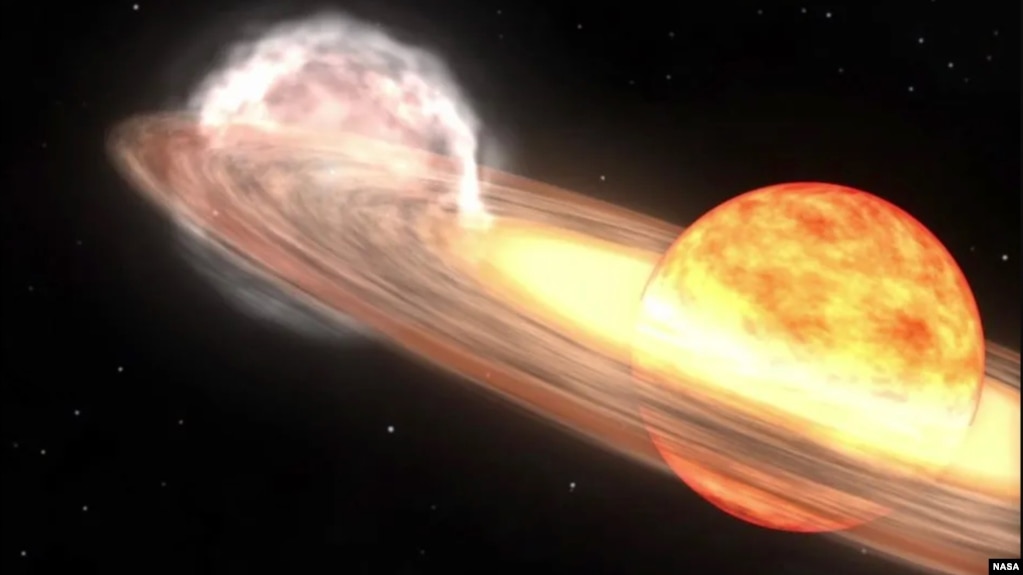AUDIO
NASA: Nova Explosion to Be ‘Once-in-Lifetime’ Event in Night Sky

The American space agency NASA says a huge star explosion is expected to light up the night sky later this year. NASA describes it as a “once-in-a-lifetime” event.
The event is known as a nova. It happens when changes to a star cause it to release a large amount of energy and it becomes very bright. This activity is only temporary and such stars usually return to their normal state after experiencing a nova event.
Astronomers have predicted the nova is likely to happen by September 2024. The expected event will involve a two-star system – called a binary system – in the constellation Corona Borealis, also known as the Northern Crown. This constellation is about 3,000 light years from Earth. A light year is the distance light travels in a year – about 9.5 trillion kilometers.
The binary system is called T Coronae Borealis. It contains two gravitationally linked stars – a white dwarf and a red giant.
NASA describes a white dwarf as the remains of an Earth-sized star that died. A white dwarf is formed when the star burns off all its central nuclear fuel and loses its outer layers.
A red giant forms when a star releases large amounts of hydrogen at its center. This loss of energy causes the star to begin to collapse. But the process also increases the red giant’s temperature and pressure, leading to new releases of energy that can affect nearby objects.
Astronomers say a red giant’s release of hydrogen in a binary system causes a heavy buildup of pressure and heat on the white dwarf. Over time, such buildup can cause a “thermonuclear explosion” large enough to blast away the material the white dwarf had collected.
This process differs from a supernova. NASA describes a supernova as an “extremely bright, super-powerful explosion of a star.” The main difference is that a supernova is the final destruction that happens at the end of a particular star’s life. In a nova, the white dwarf remains active after the event.
Scientists believe novas appear to repeat, on average, about every 80 years. NASA notes that nova events can keep happening “for tens of hundreds or thousands of years.” That is why the space agency called the upcoming nova a “once-in-a-lifetime event.”
Scientists say the nova explosion will be so bright, people should be able to see the resulting light without telescopes or other special equipment. The bright light can make it appear as though a new star has formed in the sky.
It will be at least the third time humans have witnessed a nova, the French news agency AFP reports. The event was first discovered by Irish astronomer John Birmingham in 1866 and then reappeared in 1946.
Sumner Starrfield is a professor of astrophysics at Arizona State University. He told AFP he was very excited to see the nova event. He has studied the T Coronae Borealis star system at different times since the 1960s.
Starrfield is currently working on a scientific paper to predict what astronomers will learn about the repeating nova, whenever it shows up. "It could be today... but I hope it's not," he joked.
Rebekah Hounsell is a research scientist specializing in nova events at NASA’s Goddard Space Flight Center in Maryland. She said that interest in the event may “create a lot of ... astronomers out there.” She hopes this can give young people “a cosmic event they can observe for themselves, ask their own questions, and collect their own data.”
She added that the nova event might even be helpful to “fuel the next generation of scientists.”
_____________________________________________
Words in This Story
astronomer – n. a person who studies stars and planets
constellation – n. a group of stars that forms a particular shape in the sky and has been given a name
excited – n. feeling very happy and enthusiastic
cosmic – adj. relating to the whole universe
https://learningenglish.voanews.com/a/nasa-nova-explosion-to-be-once-in-lifetime-event-in-night-sky/7664089.html